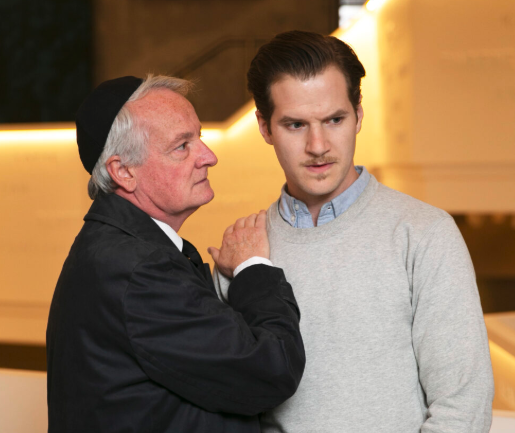Isaac’s quest for identity
Join Isaac Adams as he embarks on a search to answer questions about his heritage and religion in Shalom’s annual play, The God of Isaac, opening at the Eternity Playhouse.

WHAT does it mean to live Jewishly? Asked this question during a panel discussion at Shalom’s Limmud Oz earlier this year, Emanuel Synagogue’s Rabbi Rafi Kaiserblueth recalled a spirited conversation with a group of Emanuel School high school students about what it means to be Jewish.
“The things that some of the high school students were throwing out as answers were: Is it a people, a race, an ethnicity, a religion, faith, tradition, heritage?” In the end, it all coalesced to “Yes!”, exclaimed an enthused rabbi. “It’s all of those things, and to take one of those things out of the equation is to unravel the entire tapestry.
“This is not to say that someone needs to believe in all of those things, but everything we do is so enmeshed in all of those things,” he emphasised. What seems inherent in the students’ responses is that there is no one-size-fits all approach.

Like these students, in The God of Isaac, presented by Shalom and Moira Blumenthal Productions that opened last week, a young second generation Jewish American journalist similarly seeks answers to this open-ended question.
“What does it mean to be Jewish? is really the question that runs through the whole play, which sounds simplistic, but it’s not,” remarked director Moira Blumenthal. She describes Judaism in a similar fashion to Rabbi Kaiserblueth, supplanting the word “tapestry” for “mosaic”.
“It’s a bit like building a mosaic of different colours,” said Blumenthal. “That’s how visually it looks to me. Isaac Adams has built this mosaic trying to get an answer, something tangible, something you can hold onto, and of course there is no one answer in terms of what it is to be Jewish.”
Prompted by the neo-Nazi riots in Skokie, Illinois, in the 1970s, Isaac embarks on his journey of self-discovery. Each person he encounters along the way – among them, a rabbi, and a Holocaust survivor – adds another colour to his vibrant mosaic. He searches far and wide, but the person who brings it all together is standing right there in front of him.
“When we get to the end, his mother says to him, ‘Nobody can walk the walk, you have to walk it on your own.’” Knowledge is one thing, but some things, to be fully understood, need to be lived.
“There’s this running joke that you can’t chew with somebody else’s teeth. Eventually Isaac says, ‘What does that mean?’, and his mother responds, ‘You have to walk the walk.’”
ISAAC is among friends in his identity crisis, and the playwright, James Sherman, makes this point apparent by referencing other theatrical characters who are questioning their sense of self.
Blumenthal explained, “Huckleberry Finn has a crisis of conscience because he took away somebody’s slave, then we go into the The Wizard of Oz with these people trying to find their particular character traits, then we go into Pygmalion as Higgins tries to teach Eliza the language that is important to him.
“James creates an even further dimension in that the acting scenes are actually changed into using Jewish terminology. They are very funny. The Rain In Spain is sung in Yiddish, for example.”
So what can we learn from it all? Nothing and everything, all at the same time. “I think the overall message is that we all ask those questions,” said Blumenthal. “Who are you? What are you doing? Who is your group? Where do you belong? What do you do to feel like you belong?”
There are some golden nuggets of wisdom that might guide those who are asking questions – “One of the wonderful statements is that you have to know where you have come from in order to know where you are going, and this is the realisation or the recognition of Isaac’s heritage which he has left behind,” said Blumenthal, but in the end, she remarked, “I don’t know if it gives you a definitive answer, I don’t think there is one.”
SINGER and actress Alexis Fishman, who plays Isaac’s Jewish girlfriend, Chaya, in The God of Isaac, expands Isaac’s questioning to other facets of identity.
“These questions are important to everyone,” she said. “What does it mean to be a woman, an Australian, an actor? What does it mean to be anything that we identify with?” There is no simple answer, and if there was, when one question is answered, often others arise. “You can’t know it all and there are always going to be questions and things to discover,” said Fishman.
Emphasising this point, Fishman referred to a scene in the play when Isaac meets with the rabbi, who says to him: “You don’t need to worry about the answers, you have to be comfortable living with the questions.”
“I think that’s a great directive for life in general,” Fishman commented. With a background in musical theatre, Fishman’s experience is drawn on in the play, particularly in the mini-musical scene.
“There are these cute little vignettes and one of them is a mini musical … Being the musical theatre person in the cast, I take the starring role in that musical vignette and there are these two little musical moments that will be very recognisable to an audience, so it should get a cute little laugh,” Fishman said.
That’s likely to be one of many laughs the cast will receive during the play. “I think it’s going to be funny for Jewish people because there are some very recognisable characters in there that I think people will identify with.”
HOME to many Holocaust survivors, Skokie, Illinois in the 1970s sees a group of neo-Nazis prepare for a demonstration. Four decades later, what has changed? According to James Sherman, not very much.
“We received a message from the playwright, and he makes a big point that it’s quite horrifying that what he wrote about in the late ’70s and early ’80s has now come to a head again,” said Blumenthal. The rising tide of antisemitism is “a major reason for us choosing this play”, she explained.
Ultimately, though Isaac’s journey is catalysed by a neo-Nazi march, a deeper search for meaning and belonging is at the heart of this play, as Fishman has discovered.
“When I first read the play I thought it was about antisemitism, Nazism, free speech and all these political questions, which seems to make it very relevant to what is going on today. But as we’ve rehearsed it, I actually think it’s primarily about identity and trying to figure out who you are.”
That quest can often feel isolating, but Blumenthal hopes the play will create a sense of togetherness as people embark on this journey.
“If people are questioning their Judaism, their journey or their identity, that’s okay. It’s normal. The way of life is to look at these things and try and find answers,” remarked Blumenthal.
“Besides the play being entertaining, one wants to give some sort of recognition – that we all are actually in the same boat.”
The God of Isaac is showing from September 5-22 at the Eternity Playhouse. Bookings: darlinghursttheatre.com/ whats-on/the-god-of-isaac.

comments